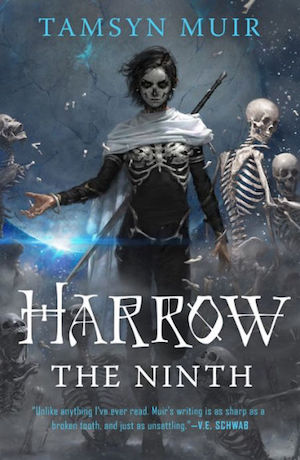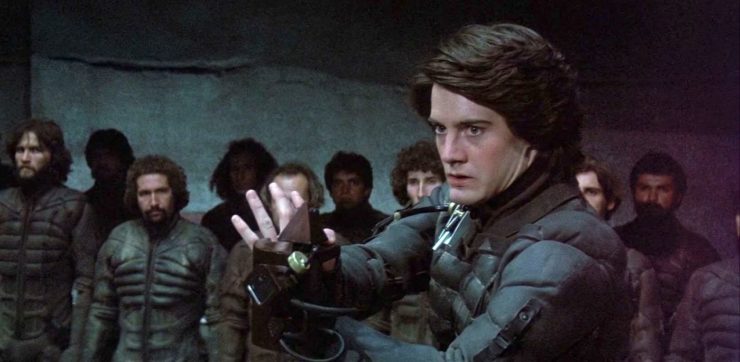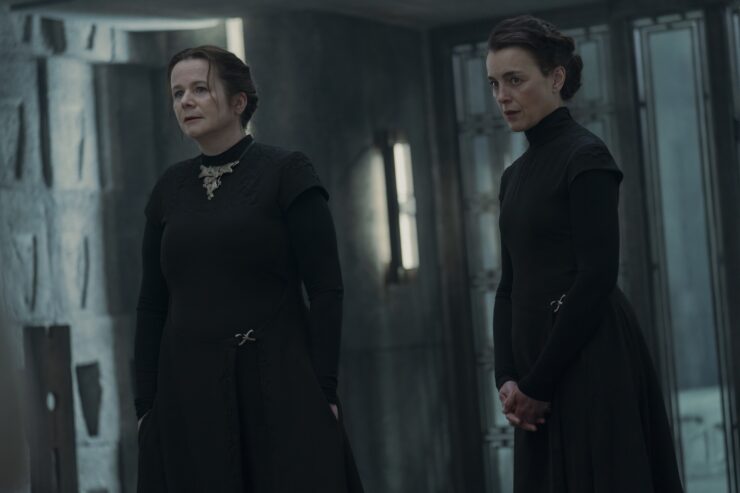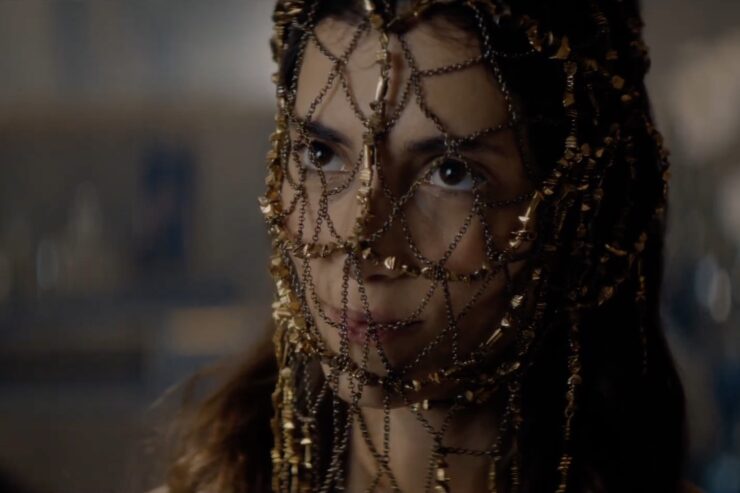If you have read Dune or watched any of its on-screen iterations, then you know all about Paul Atreides. The son of Duke Leto and Lady Jessica, trained in the Bene Gesserit ways, adopted by the fremen of Arrakis to become the legendary Muad’Dib. Paul is the culmination of a deeply unsettling eugenics program to create something called the Kwisatz Haderach, a being who can see into the future and project himself backwards and forwards in time.
And he could have been science fiction’s best known non-binary protagonist.
According to the plot of Dune, the Kwisatz Haderach had to be created via millennia of special breeding directives from the Bene Gesserit sisterhood. The all-female organization was working toward what all great shadowy organizations work toward—absolute power, namely their own puppet on the throne as emperor. Wrapped up in this desire was also a long-standing problem; spice offered the sisterhood some prescience and race memory, with the Reverend Mothers capable of looking back in time through the line of other sisters… but they could not access the male knowledge and experience in their past. It was believed that the Kwisatz Haderach would be able to look into their full history, both sides of their race memory, and also to see far into the future.
This figure was meant to arrive a generation after Paul—his mother was supposed to have a daughter who would wed the Harkonnen male heir, producing the Kwisatz Haderach. But Jessica went against the sisterhood, giving her partner Duke Leto the son he wanted, and somehow, this resulted in the fated figure appearing ahead of schedule. Paul took the water of life, a poison from the sandworms that the Reverend Mother is capable of changing, and learned of his destiny, saying:
“There is in each of us an ancient force that takes and an ancient force that gives. A man finds little difficulty facing that place within himself where the taking force dwells, but it’s almost impossible for him to see into the giving force without changing into something other than man. For a woman, the situation is reversed.”
According to Paul, he is the fulcrum between those two points, able to give without taking and take without giving. That is what makes him the Kwisatz Haderach.
Buy the Book


Harrow the Ninth
Here’s the thing: The world of Dune is bound by an essentialist gender binary that doesn’t do the story many favors, despite its careful and often inspired worldbuilding. Aside from the fact that gender isn’t a binary, the insistence upon it isn’t a clever story juxtaposition that makes for great themes and plot. It’s an antiquated perspective that reads as out of place, especially in such a far-flung future. This is especially true when you couch maleness as a “taking” force and femaleness as a “giving” force. Men and women are not naturally those things because people overall are not that easily categorized—they are expected to be those things by society. Stating it as some form of spiritual truth, as Dune does, is an awkward declaration that only gets more awkward as time passes.
In addition, Dune is a story that spends much of its narrative currency on battles between binaries. They crop up everywhere in the book: the tension between the Bene Gesserit and the Mentats; the age-old feud between Houses Harkonnen and Atreides; the conditioning of Arrakis’ fremen forces against the conditioning of the Emperor’s sardaukar; the struggle between the ruling houses and the spacing guild. While there are countless groups vying for power, and the political complexities of that do not go unnoticed, Dune still dwells on that ‘A vs B’ dynamic in all the places where it really counts. Without these binary antagonisms, the tale wouldn’t function.
For a story so taken with binaries, there is something arresting about Paul balancing male and female aspects as an implicit factor to being the Kwisatz Haderach. The real confusion lies in the idea that the Kwisatz Haderach always had to be male, as though counterbalancing generations of Bene Gesserit sisters; if the figure is meant to be a fulcrum between those two specific genders, then their own gender should be insignificant. More importantly, if that is the nature of being the Kwisatz Haderach, then coming into that power should ultimately change one’s perception and person entirely. If you’re going to be the balancing point between dual genders, then why would you be solely either of those genders? Paul literally says that being able to do what he does changes him into “something other than man.” It doesn’t make him a woman, clearly, so what’s the alternative here?
It would have been a sharper assertion for Paul to have awoken into a different gender entirely, perhaps genderfluidity or even a lack of gender altogether. This wouldn’t have altered his key actions within the narrative, but it would have added another dimension to his journey. A non-binary protagonist for a story that obsesses over binary thinking would have been a stunning wrench to throw into the works. In many ways, it would have made more thematic sense than what Dune currently offers its readers.
While the upcoming film is unlikely to go that route, it’s tantalizing to think of the story that might have been, of all the possibilities contained therein. A story set in the future that accounted for the complexities of gender identity and how it might pertain to an awakening of consciousness and purpose. Even if Paul was the first person in their time period to consider non-binary gender, that would be a powerful statement that would shape their reality for centuries to come. Perhaps others would embrace non-binary identities to honor Muad’Dib, or it would become a sacred way of being, looked upon with religious fervor due to Paul’s importance. And there are further questions as to how that would have affected the sequels as well—would Leto II also have gone that route? He turns into a sandworm, you can’t tell me they’ve got clear and separated binary genders. They’re worms. In the sand. Try again.
In a story that turns on binaries, particularly as they pertain to gender, it would have changed the whole scheme to consider Paul as a non-binary protagonist. Moreover, it would have been fascinating to see how his perspective changed as a result of being that fulcrum, not just as it related to time, but as it related to people. While the story is quick to zero in on what Paul sees in the flow of time, his “terrible purpose” in putting humanity on the Golden Path, there is no consideration for how this shift in state might effect how he sees other humans. It’s a missed opportunity to really explore what absolute power would look like in a being who can project himself into the experiences of men and women equally. Would he understand his mother better than before? His sister?
It’s not the story that we have, but there will always be a part of my mind preoccupied with these possibilities. Because it’s fun, and because it’s intriguing, and because I will always wonder about what the world would look like if more people didn’t take the concept of binaries for granted.
Emmet Asher-Perrin will be stuck on this point for forever. You can bug them on Twitter, and read more of their work here and elsewhere.














